Biodiversity Reporting
The SLCC, as a public body, is required under the Nature Conservation (Scotland) Act (2004) and the Wildlife and Natural Environment (Scotland) Act (2011) to work in a responsible way with regards to biodiversity conservation, and to produce a publicly available report every three years detailing the actions taken to meet the biodiversity duty.
SLCC Reporting on the Scottish Biodiversity Duty 2021 to 2023
A. Biodiversity and the SLCC
The Scottish Legal Complaints Commission (SLCC) is a Non-Departmental Public Body employing 60 staff at our office in central Edinburgh. As an office-based organisation, our primary contribution to the conservation of biodiversity continues to be focused on resource efficiency, the use of sustainable suppliers and encouraging staff engagement with green issues.
The SLCC has an obligation under the Nature Conservation (Scotland) Act (2004) and the Wildlife and Natural Environment (Scotland) Act (2011) to consider biodiversity while carrying out day to day responsibilities, and to produce a publicly accessible report every three years detailing the steps taken to meet the duty. This report covers the period from January 2021 to December 2023, and follows on from our third Biodiversity report, published in January 2021.
In previous reports, we highlighted Senior Management and Board commitment to improving resource efficiency and we hope to illustrate progress in this area, particularly around the office move work.
B. Actions Taken
The Sustainability Policy was last reviewed in 2023 and sets out our primary aims around reducing paper consumption, minimising corporate travel, sustainable procurement, reducing wasted energy and promoting recycling. The policy is easy to read, readily accessible to all staff, and is reviewed every three years. Highlighted in the policy is our sustainability promise to continue to look for improvements in our way of working, to provide bi-annual updates to staff and the Board on our sustainability performance, and to support internal engagement events.

The SLCC provides two paid volunteering days each year, and colleagues are encouraged to use some of this time to support our charity of the year. Our charity for the 2023-24 year is the Scottish SPCA, and we hope to raise £2,000 by the end of the partnership to help fund their work protecting animals across Scotland. We also plan to arrange volunteer days with the Scottish SPCA before the end of our charity year.
There were two main events within the reporting period that really helped to drive our sustainability efforts forward. The first was the SLCC’s response to opening back up after the Coronavirus lockdowns, and the second was the office move project in the summer of 2023.
As stated in the previous report, we expected many of the changes prompted by the Coronavirus lockdowns to become long-term changes to the way of working at the SLCC, including the shift to paperless digital files and this has been found to be the case. The closure of the office and the move to home working in March 2020, gave us the opportunity to pilot fully paperless case files. Prior to this, we had implemented paperless case files for some (generally shorter) case types, however our main cases were held as digital files with a full paper copy alongside.
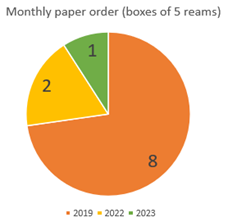
When the time came to re-open the office to colleagues, we had already proved that we could work with paperless files and colleagues had the equipment in place to enable them to work effectively in this way, so the decision was taken to move from our paper-lite to a fully paperless approach. The change has had a very positive and wide-reaching impact on our paper consumption, printer/copier use, our stationery spend, our postage costs and our storage space requirements. We previously reported our goal of becoming paperless by 2024, which was part of the organisational strategy developed and consulted on in 2019-20. The legal sector has traditionally been very reliant on hard paper copies, so part of our work in the period has been around implementing technologies to make it easier for Firms to submit electronic files, helping us to digitise our process. Coronavirus did have some negative impacts on the SLCC’s sustainability efforts, for example the wrapped single use catering equipment required for infection control generated more waste than the regular washable crockery and cutlery and bulk-bought tea and coffee used previously. We provided sustainable options where possible such as bamboo stirrers, and moved away from single use and individually wrapped items as soon as it was deemed safe to do so. We also took care to ensure that any remaining stock was used up or donated rather than wasted.
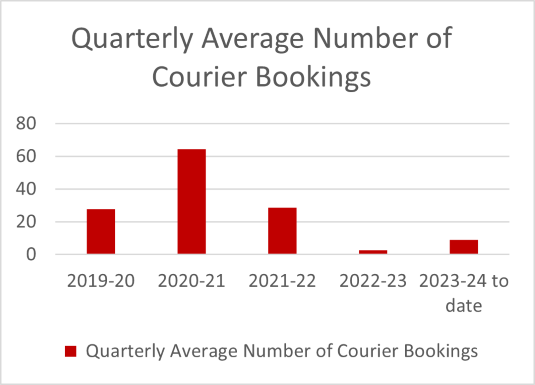
The use of couriers also increased during periods of office restrictions, and while it had a negative environmental impact, it was necessary to allow work to continue. Courier use has now reduced to below pre-pandemic levels, and this is largely attributable to the move to digital-only files. The move to new office premises will be covered in greater detail under Section G, however it is worth noting that there were a phased series of actions around the move, and that improved environmental performance was written into the business case for moving.
C. Mainstreaming
The SLCC have been holding internal engagement events since 2015, and we maintain our commitment to changes made in previous reporting periods.
We have been a member of the Cycle to Work scheme since 2015, and the NHS Fleet scheme since 2020 and continue to offer travel loans to help promote the use of public transport. We buy eco-friendly dishwasher tablets and on taking a new cleaning contract for our new office premises, the provision and use of eco-friendly cleaning products was an important consideration.
Our office planting still uses a peat free system and provides colleagues with a link to nature even when they are sitting at their desks. We switched to recycled printer/copier paper in February 2022, however the digital-only files mean that our stationery consumption has significantly reduced over the period.
Recycling facilities are available in the office for paper, confidential paper, cardboard, cans, plastic bottles, food waste, printer cartridges, batteries, and glass. To boost colleague engagement, and help answer common questions around plastic recycling, we organised a presentation to be delivered by our recycling partner Change Waste to all staff at a weekly team meeting in December 2021. Although we have adequate recycling facilities in place, we still strive to look for process changes that we can make to eliminate waste in the first place, for example in May 2022 we moved from a folder of individual printouts to a fully digital induction pack for new colleagues.
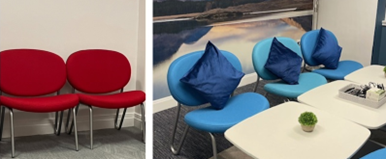
The office refurbishment project was paused in March 2020, and when the project resumed in 2021, we took the decision to take a more sustainable approach. Instead of replacing the existing functional but dated, furniture wholesale (as was originally planned) we had existing chairs recovered in March 2022, and took the opportunity to reuse items which were no longer required by another tenant in the Stamp Office, including monitors, eight tables, 13 chairs and two reception chairs. This was a cost effective and environmentally friendly way to deliver a refreshed, flexible, and cohesive office environment, and is an example of how we adhere to our sustainability policy commitments.
D. Working in Partnership
When sourcing a new hot and cold-water dispenser in 2022, we chose a local company who collect their water from the Lammermuir hills in East Lothian. It was important to us that we minimise the carbon footprint relating to water refill deliveries, and the dispenser unit chosen is fitted with an eco-sensor to reduce energy use by up to 25%. We have used the same Midlothian-based milk delivery service since 2013 and we collect catering and fruit from local shops and cafes wherever possible. We are conscious of delivery related carbon emissions, and as such we take care to bundle stationery or facilities orders to minimise deliveries. As will be covered in section G, a significant focus of our office move project was the re-homing of items that we no longer needed. We worked with our removal partners as well as local charities and groups to find a use for items that otherwise would have been recycled or sent to landfill.
E. Communication and Engagement
We have two members of staff with long-standing volunteer commitments which aid biodiversity. One person volunteers with the Holyrood Park Rangers Service, supporting the wide range of service users and the local conservation of this important site, and has used paid volunteer days to support this. Another colleague regularly visits Inveresk Lodge Garden to refill bird feeders, giving them the opportunity to see and support a variety of birds in their natural habitat.
We run colleague engagement campaigns twice a year, focusing on Scottish Climate Week in October and events around Sustainability in March (including Earth Hour). Where possible, we also use other events such as the Scottish Workplace Journey Challenge and Plastic Free July to highlight environmental issues and ways in which colleagues can help to reduce their environmental impact. Our Wellbeing and Inclusion Group are involved in the design and delivery of engagement campaigns, and we strive to deliver information in different formats to help ensure we keep campaigns interesting and engaging.
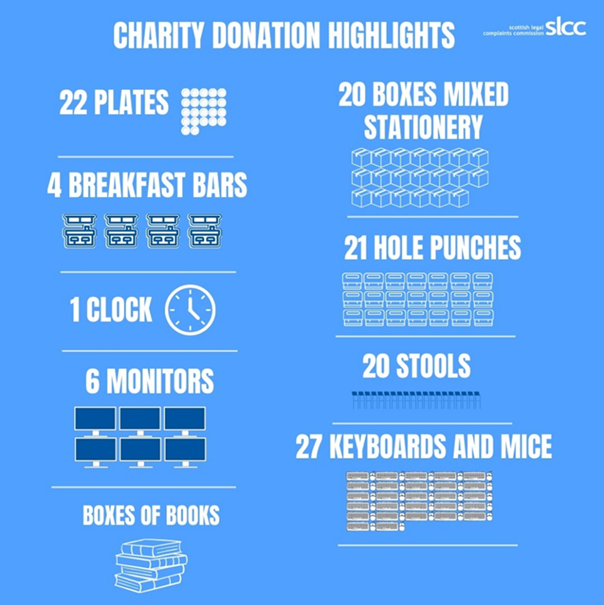
We often use these biannual events to highlight our successes, and in the last year our campaigns have really celebrated how we were able to re-use items in the office move project. We were particularly keen to illustrate how staff connected us with lots of local organisations (including playgroups, schools, Girl Guide groups, Scout Association groups and local charities supporting a range of good causes) in order to re-home countless items that we no longer needed. Colleagues took the time to deliver donations to groups and charity shops and their support in the office clearance project was a key component of our success.
F. Monitoring our Performance
As part of our Climate Week activities, we issue surveys to all colleagues (staff and Board) asking for their views on recycling provision and areas for improvement. In previous years we used this feedback to raise awareness of the recycling facilities already available to colleagues and to lobby the building owners to provide food waste recycling facilities. The most recent survey shows that staff want recycling options for additional waste streams such as soft plastic and crisp packets, and this is something that we will follow up with our recycling providers. Our travel surveys in 2020 and 2023 show that most people still use public transport to get to the office. We had three car parking spaces at the Stamp Office, but there is no parking provided at the Capital Building and the choice of a parking-free building demonstrates our commitment to promoting sustainable travel.
G. Highlights, Challenges and Aims for the Future
The clear highlight for this reporting period was the office move project. The office move can be separated into three stages – firstly, the development of the business case for moving and the choosing of the new premises, secondly the clearance of the Stamp Office and thirdly the move itself. After careful consideration of our space requirements considering hybrid working and paperless files, the decision was taken to reduce the footplate of the office by 55% from 8,006 to 3,582 square feet. The Capital Building met our space needs, as well as other requirements such as access to public transport and amenities, and the location on St Andrew Square was also an important aspect as it gives staff the opportunity to easily access green space even whilst in the city centre, which we recognise is important for overall wellbeing.
The SLCC was based at the Stamp Office for almost 15 years, and for 12 of those years, our process was extremely paper heavy therefore adequate storage space was required for open cases as well as archival storage for closed cases. An important step in the office move process was the clearing of our storage space on Level 2 of the Stamp Office.
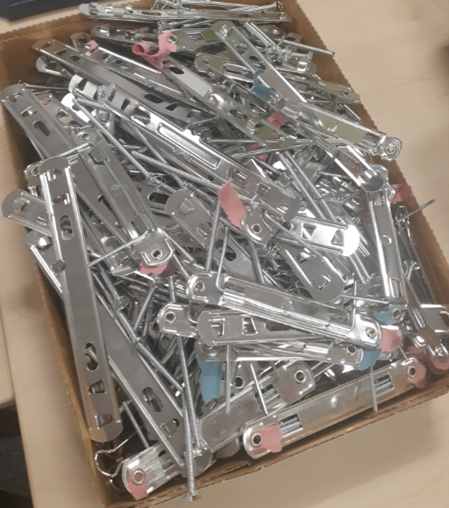
Paper files which were eligible for destruction (as set out in our retention policy) were stripped into their component parts to allow for confidential shredding of the confidential papers, cardboard recycling of the outer file, metal recycling of the metal prongs and compression bar and re-use of file dividers, binder clips and any other small stationery items. Between January and early September 2023, we arranged for the collection of 151 bags of confidential paper for confidential shredding by Change Waste.
The project team responsible for designing the new office focused their efforts on transforming the open space to an office that suited our needs, while designing the kitchen around the re-use of the existing kitchen cupboards and appliances from the Stamp Office and minimising the need for construction. We were even able to use linoleum that was delivered in error as part of the office refurbishment project in 2019, and our spare kitchen cupboards have been used to create a very practical post and stationery area.
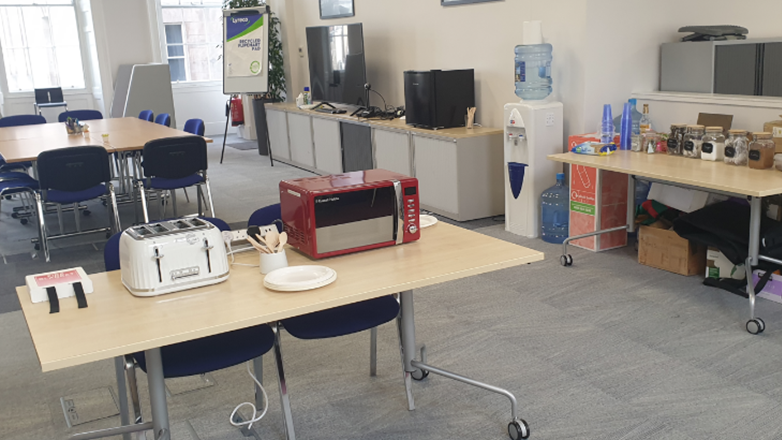
While the removal of the kitchen from a working office did cause an inconvenience to colleagues, they were quick to adapt to the challenge by bringing in reusable cups and water bottles.
Due to the reduced number of desks required at the new office, we had IT equipment, stationery and storage facilities that were no longer required, and we actively sought to pass items on to colleagues for home working or to other organisations to minimise waste. Metal storage units including cabinets, pedestals and filing cabinets, as well as boxes of metal fixings from spring files were collected by a metal recycling contractor, and our removal partners Bureau Move arranged both the moving of items to the new premises and the collection and re-sale or recycle of furniture that we no longer needed. Instead of replacing our ageing desk chairs, they were refurbished and cleaned before being delivered to the new office, whilst the remainder were passed on for resale. At the end of the project, Bureau Move calculated that the total avoided emissions within the project equated to 6.64T which is something that we are very proud of.

Our main sustainability challenge was around how we disposed of items from the Stamp Office that were no longer needed. As we have detailed, we contacted local charities, we asked staff if they (or friends and family) could make use of items at home or if they knew of any groups that could make use of these items. As a last resort we arranged to have items recycled. In the end, we were able to donate a significant amount to charities for re-use.
Our aim for the next three years is to accurately calculate our carbon footprint, both in traditional and digital terms, so that we have a set benchmark and which we can then work to reduce. We will also work with suppliers to look for recycling options for waste streams that are currently not collected such as soft plastics.